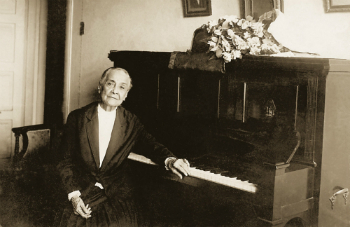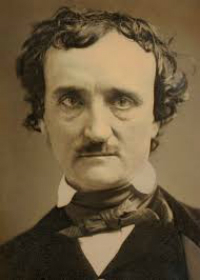Chiquinha Gonzaga (1847-1935) was a pianist, conductor and composer from Rio de Janeiro. Considered one of the greatest influences of Brazilian popular music, she was the granddaughter of a freed slave and was the first woman to conduct an orchestra in Brazil.
Her life was marked by success in music, the challenge to the patriarchal society of the regency period and the abolitionist struggle.
Chiquinha Gonzaga's participation in the Brazilian artistic scene was fundamental to the definition of the country's musical identity at the beginning of the 20th century.
Among the best known works by Chiquinha Gonzaga is the carnival march "o Open Wings", composed in 1899.
Biography

Chiquinha Gonzaga was born Francisca Edwiges Neves Gonzaga, on October 17, 1847. Her father was the military José Basileu Neves Gonzaga and her mother Rosa, the daughter of a slave. She was brought up for the trades of the home, to be a society lady, and taught herself to play the piano.
She was married by her father's imposition when she was 16 years old to Jacinto Ribeiro do Amaral, a businessman who mistreated her. The union lasted two years and, at 18, Chiquinha Gonzaga goes to live with the engineer João Batista de Carvalho.
The pianist's love life was marked by scandals at the time, because she also divorced her second husband, who betrayed her. The family did not support her and Chiquinha turned more and more to music after losing custody of her children.
From 1877 onwards, she started to make music a profession, a condition that was still unprecedented for the female figure in Brazil. His first successful composition was "Attractive"but did not yield the expected success.
Chiquinha had the help of the Portuguese pianist Artur Napoleão dos Santos to improve his piano technique. The partnership earned her her first regency in the theater, in January 1885, when she presented the operetta "the court in the countryside".
This phase was marked by the absence, in the local press, of the female equivalent of the word maestro. The then conductor composed and conducted pieces of different genres.
She was considered to defy the standard of the time for declaring herself an abolitionist. She even sold sheet music to raise funds that were destined for the "Liberating Confederation". One of its musicians, José Flauta, was a freed slave, whose freedom was bought by Chiquinha Gonzaga.
The consecration with music comes at the turn of the century, with the marchinha "o Open Wings". The song was repeated at the turn of the 19th to the 20th century and is kept in the carnival repertoire to this day.
When she reaches the age of 52, another Portuguese person marks Chiquinha's life. The novel entered the collection of scandals from the artist's life. João Batista Fernandes Lage was 16 years old when he became involved with the Brazilian. He even adopted her last name and started signing João Batista Gonzaga.
It was the companion who helped her in the organization of the "Brazilian Society of Theater Authors". The organization helped protect the artist's copyright.
Death

Chiquinha Gonzaga died in Rio de Janeiro, aged 87, on February 28, 1935. Her body was buried in the Catumbi cemetery.
Tributes
The importance of Chiquinha Gonzaga for national music was also recognized by law. From 2012, on the date of the artist's birth, October 17, the "Day of Brazilian Popular Music" began to be celebrated.
In 1999 the Globo television network reproduced the miniseries "Chiquinha Gonzaga" focused on the artist's life and work. Also, she was a character in the movie "Brasilia 18%" (2006), paper developed by Bete Mendes.
Given its importance to Brazilian culture, its name is on the country's avenues, streets, squares and schools.
Constructions

Chiquinha Gonzaga's work includes pieces for piano, solo piano and singing. The artist walks through different rhythms, such as Brazilian tangos, songs, polkas, waltzes, habaneras, fados, ballads, modinhas, choros, mazurkas, dubs, duets, serenades and sacred pieces.
Chiquinha Gonzaga's collection was protected by fellow João Batista Gonzaga, but there are many works that are still unpublished. The collection is organized by Instituto Moreira Salles.
songs
"o Open Wings" was the first carioca carnival marchinha. Until its release in 1889, the cordões did not follow their own music. The carnival game took place in the halls to the sound of polkas, waltzes and mazurkas.
The marchinha was composed as an allusion to the movement of the Rosa de Ouro cordon in Andaraí, where Chiquinha Gonzaga lived.
The conductor composed the marchinha for piano, singing, violin, double bass, cello, clarinet, trombone and trumpet.
o Open Wings
o open way
that I want to pass
o open way
that I want to pass
I'm from the lyre
I can not deny
I'm from the lyre
I can not deny
o open way
that I want to pass
o open way
that I want to pass
rose of gold
It's going to win
rose of gold
It's going to win
The fad "White moon" is also among the best known in Chiquinha Gonzaga's collection. The verses are of unknown authorship, but Chiquinha won a lawsuit for copyright and held the mastery of the work. In 1912, the artist prepared the song for the forrobodó style.
White moon
Oh! White moon of glows and enchantment
If it's true that love you give shelter
Come take the tears from my eyes
Oh, come kill this passion that walks with me
Oh, for who you are, come down from heaven… Oh! White moon,
That bitterness in my chest… Oh! come on
Give me the moonlight of your compassion
Oh! Come, by God, enlighten my heart.
And how many times in heaven did you appear to me
Read too:
- History and Origin of Carnival
- Samba
- Popular Brazilian Music
- Feminism in Brazil
- Women Who Made the History of Brazil


